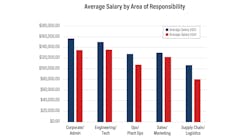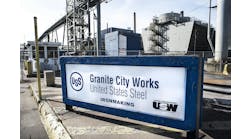"We have to take the fight to those who would make us compete with one hand tied behind our backs," Nucor Corp.'s John Ferriola told several hundred manufacturers in April at IndustryWeek's 2010 Best Plants Conference in Cleveland.
Ferriola, chief operating officer of steelmaking operations for Charlotte, N.C.-based Nucor, was referring to China and other countries that are believed to flout international fair trade rules. In his keynote address, Ferriola asserted that trade deficits with China and other unscrupulous trading partners are "destroying American manufacturing and they are putting Americans out of work."
"Globalization is a good thing. It expands our markets, creates new trade relationships and allows goods and raw materials to flow around the planet," Ferriola said. "But when governments ignore or deliberately break the rules by which we agree to trade -- by engaging in currency manipulation, employing illegal export subsidies or intervening in commodity negotiations -- then our businesses, your businesses, are forced to compete with entire nations.
"Our government must hold these parties accountable at the World Trade Organization and in our own World Trade Organization-compliant trade agreements."
Ferriola emphasized that U.S. manufacturers "are not asking for any advantages." He struck a confident tone when he asserted that Nucor welcomes competition from companies in emerging economies such as India and South America, "because they apparently, at least now, are playing on a level playing field."
"We're asking for a level playing field -- nothing more."
Ferriola's remarks came just a few days before Nucor -- the nation's largest steelmaker based on its 2009 sales -- announced that it posted its second straight quarter of profitability. Nucor reported first-quarter net earnings of $31 million and first-quarter net sales of $3.65 billion, the latter of which was a 24% increase over fourth-quarter 2009.
Ferriola noted that "we are seeing some small signs of hope" in the U.S. economy. He pointed to a "slight uptick" in capacity utilization in recent months, although he noted that "we're climbing back from the lowest point in capacity utilization since the 1940s."
Job Creation is Job One
Still, despite signs that the economy is slowly on the mend, Ferriola reiterated Nucor's position that policymakers at all levels of government need to make job creation their top priority. He asserted that we are experiencing the "hangover" from "the market created by credit on steroids," and the U.S. economy may never be the same.
"We don't believe that we will see the kind of credit-fueled demand we saw in the past decade anytime soon," Ferriola said, adding that "our nation is transitioning from a debt-driven economy to a savings-driven economy."
"Consumers will be using less debt, and end-use demand will be determined by what they can afford as opposed to what they can borrow. This reduction in end-use demand will put pressure on all of our industries to maintain a balance between supply and demand."
He summed up his outlook of the U.S. economy this way: "I think the best we can say is that the future will be a time of great challenge. But I believe that great challenges present great opportunities for great companies."
Ferriola asserted that there are three keys to creating jobs in the United States: achieving energy independence, balancing the trade deficit and rebuilding the nation's infrastructure.
Regarding the first point, he called for a "realistic plan" to achieve energy independence, consisting of a mix of traditional energy sources and renewable sources such as wind and solar power.
"Renewable energy sources will be an important part of the energy mix going forward, but renewable energy is only part of the solution," Ferriola said. "The reality is that right now and for decades to come, only nuclear power, natural gas and coal can provide energy on the scale required for our economy and our energy-intensive industries."
While his message centered on the role of elected officials in revitalizing U.S. industry, Ferriola added that manufacturers have a responsibility to "make sure that our voices are heard in our communities and in the halls of our governments."
"If America's elected leaders take care of their part of the bargain, we in the manufacturing sector will take care of our part of the bargain," he said.



